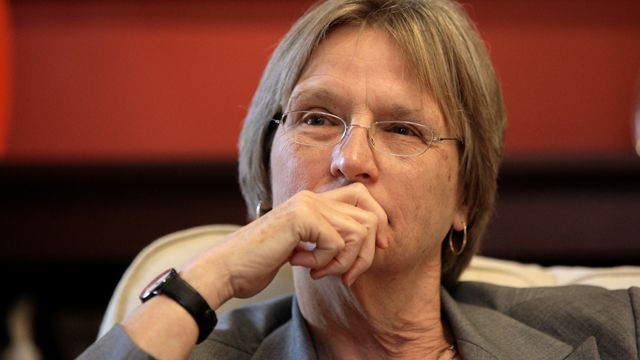
In an open letter published today, nearly 100 professors at Harvard University called on university president Drew Faust to divest the school’s endowment — the largest in the country — from the fossil fuel industry.
The letter follows a statement by Faust on Monday in which she said the school would invest more responsibly in the future, and had signed on to a responsible investing program — the United Nations-supported Principles for Responsible Investment — as well as the Carbon Disclosure Project’s climate change program to measure the school’s carbon footprint, but would not be divesting from fossil fuels.
Today’s letter, signed by 92 professors, said not doing so is a mistake. It reads, in part:
Our University invests in the fossil fuel industry: this is for us the central issue. We now know that fossil fuels cause climate change of unprecedented destructive potential. We also know that many in this industry spend large sums of money to mislead the public, deny climate science, control legislation and regulation, and suppress alternative energy sources.
The letter notes the success of other historical divestment campaigns, and Harvard’s leading role in them as an institution with both prestige and financial clout:
Slavery was once an investment issue, as were apartheid and the harm caused by smoking.
In the past, the University did divest from certain industries on ethical grounds. Harvard’s leadership—initiated by faculty, students, and alumni—is credited with making campaigns against apartheid and smoking far more effective.
The fossil fuel divestment movement championed by many environmental organizations, most prominently Bill McKibben’s 350.org, has seen a series of victories over the last year. So far, nine colleges and universities have committed to divest from fossil fuels, and numerous cities, counties, religious institutions and philanthropic organizations have also signed on.
As Matthew Yglesias noted at Slate, divestment doesn’t hurt the finances of the company from which an institution is divesting, but it sends a message that the institution wants no part in the company’s socially irresponsible activity. He wrote, “Divestment says: If you make your fortune digging fossil fuels out of the ground and poisoning the air by burning them, then people are going to shun you and your business. Maybe you’d like to consider a different line of work?” (A Harvard graduate, Yglesias signed a petition urging the university to divest.)
In an October letter explaining the university’s decision not to divest, Faust argued, essentially, that Harvard could do more to fight climate change with a healthy and robust endowment to fund sustainability research: “Significantly constraining investment options risks significantly constraining investment returns,” she wrote. Faust also expressed reluctance to divest because the school should “be very wary of steps intended to instrumentalize our endowment in ways that would appear to position the university as a political actor rather than an academic institution.”
In today’s letter, faculty members countered that divestment could be done in a way that would maintain — and perhaps even increase — the endowment’s rate of growth: “A number of studies, including one by S&P Capital IQ, demonstrate that over the last ten years, for example, an endowment reflecting the S&P 500 without targeted fossil fuel companies would have outpaced one with them,” they wrote. And the letter suggested a contradiction in the president’s recent re-commitment to sustainability, noting that the “President and Fellows are working assiduously to reduce the university’s greenhouse emissions, while maintaining investments that promote their increase locally and worldwide.”
Faust’s statements and the faculty’s open letter today come in response to a campaign led by Harvard students to push the university to divest. Today’s open letter was the professors’ initiative, and had been making the rounds among faculty since December, said Chloe Maxmin, a junior at Harvard and a coordinator in the divest Harvard movement, in an email to BillMoyers.com.
Maxmin said the university’s decision to sign on to the UN-supported Principles for Responsible Investment and to create a Climate Change Solutions Fund were successes for the movement. “However,” she continued, “Harvard is still investing millions in climate destruction. In order to achieve our goals of investing responsibly AND to align our values, Harvard must divest.”


